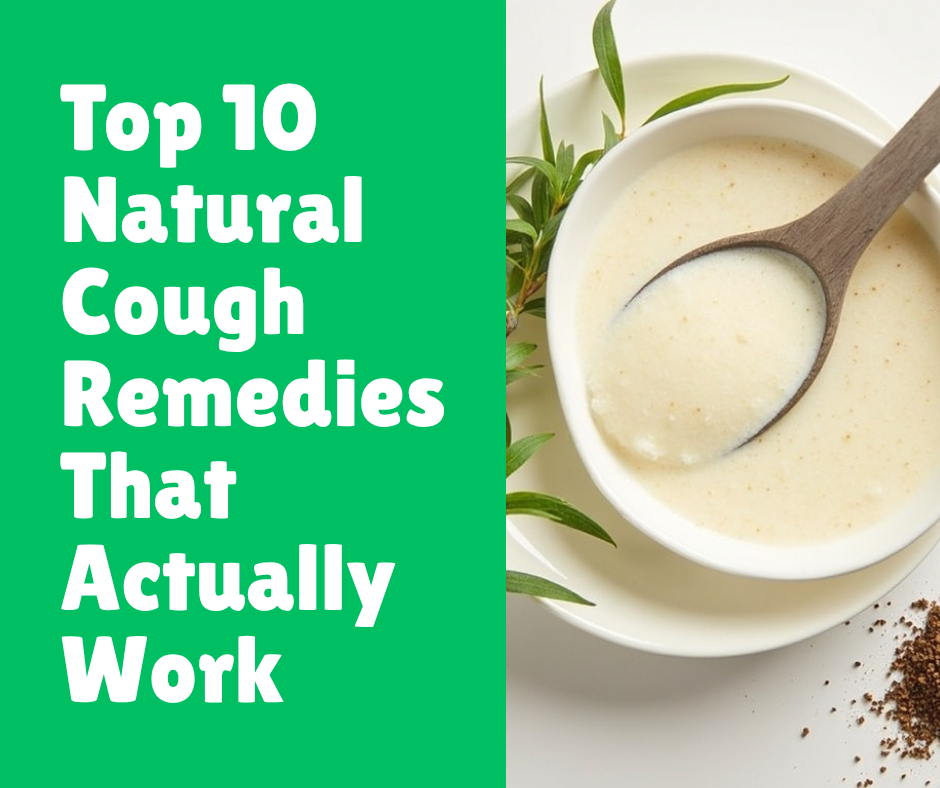Top 10 Natural Cough Remedies That Actually Work
Post Disclaimer
Content on this site is for educational use only and not a substitute for medical advice. Herbal remedies are based on traditional knowledge and not medical recommendations. Please consult a healthcare professional before trying any herb. We do not assume responsibility for any outcomes or adverse effects resulting from the use of information provided here.
Coughing. It’s something we all experience at some point, whether due to a cold, allergies, or even just dry air.
While it’s a natural reflex to clear the throat, persistent coughing can be more than just an irritation. It can disrupt your daily life and leave you searching for relief.
Thankfully, there are several natural remedies out there that can help soothe and reduce your coughing without relying on harsh chemicals or medications.
In this post, I’ll walk you through ten natural remedies that have proven to work, along with personal insights, step-by-step instructions, and some common mistakes to avoid. Let’s get to the good stuff!
1. Honey and Lemon: The Dynamic Duo
When it comes to soothing a sore throat and calming a cough, honey and lemon are an age-old remedy that actually works.
Honey acts as a natural cough suppressant, while lemon provides vitamin C to boost your immune system. Together, they create a powerful combination.
How to Use:
- Squeeze the juice of half a lemon into a glass of warm water.
- Stir in one tablespoon of raw honey (choose organic if possible).
- Drink this concoction 2-3 times a day to soothe your throat and reduce coughing.
Why It Works:
Honey coats the throat, reducing irritation, while lemon helps cut through mucus and supports your immune system.
I’ve found that honey with a touch of lemon not only helps with coughing but also feels comforting when you’re fighting a cold. I like to sip this remedy slowly throughout the day—it makes me feel like I’m actively taking care of myself.
2. Ginger Tea: A Powerful Anti-Inflammatory
Ginger is well-known for its anti-inflammatory properties. It can help reduce inflammation in your airways, which is especially useful for coughs caused by irritation or allergies.
How to Use:
- Peel and slice a fresh ginger root.
- Boil 2-3 slices in water for 5-10 minutes.
- Strain and add a teaspoon of honey or a squeeze of lemon for extra flavor.
- Drink 1-2 cups of ginger tea a day.
Why It Works:
Ginger is packed with antioxidants and compounds that reduce inflammation and soothe the throat.
Common Mistakes to Avoid:
Some people tend to over-brew ginger tea, making it too strong. If you’re new to ginger, start with a smaller amount and gradually increase as needed.
3. Steam Inhalation: Relieve Congestion Naturally
Steam inhalation is one of the most effective and simple remedies for a cough caused by congestion or sinus pressure. It helps to loosen mucus and moisturize the airways.
How to Use:
- Boil a pot of water.
- Once it’s boiling, remove it from the heat and add a few drops of essential oils like eucalyptus or peppermint (optional, but very soothing).
- Lean over the pot and cover your head with a towel to trap the steam.
- Breathe deeply for about 10-15 minutes.
Why It Works:
The warm steam helps to thin out mucus, making it easier to expel, while the moisture soothes irritated airways.
I find that adding a few drops of eucalyptus oil to the steam makes the experience much more effective. It opens up the airways and gives me a feeling of relief almost instantly.
4. Saltwater Gargle: A Quick Soother for Throat Irritation
If your cough is caused by a scratchy throat, a simple saltwater gargle can help reduce inflammation and kill bacteria.
How to Use:
- Mix 1/2 teaspoon of salt into a glass of warm water.
- Gargle with the mixture for 30 seconds, then spit it out.
- Repeat 2-3 times a day.
Why It Works:
Saltwater helps to reduce swelling in the throat and draws out mucus.
Common Mistakes to Avoid:
Don’t use too much salt it can irritate your throat further. A little goes a long way!
5. Herbal Teas: Chamomile, Thyme, and More
Certain herbs can help with coughing by relaxing the muscles of your throat and easing irritation. Chamomile and thyme are particularly effective for this.
How to Use:
- Steep 1-2 teaspoons of dried chamomile or thyme in a cup of hot water for 5-10 minutes.
- Strain and sip slowly.
- Add honey for extra soothing effects.
Why It Works:
Chamomile has anti-inflammatory properties, and thyme is known for its ability to relax the throat muscles and reduce coughing.
6. Apple Cider Vinegar: A Powerful Natural Antiseptic
Apple cider vinegar (ACV) has a variety of uses, and one of them is soothing a persistent cough. It has antimicrobial properties that can help fight infections that may be causing the cough.
How to Use:
- Mix 1-2 tablespoons of raw apple cider vinegar in a glass of water.
- Drink this mixture 2-3 times a day.
Why It Works:
ACV helps balance your body’s pH levels and provides a mild antiseptic effect.
I recommend starting with a small amount of ACV and gradually increasing it. It can be intense for some, so go easy on your first few tries.
7. Turmeric: The Golden Healer
Turmeric, particularly the active compound curcumin, is a powerhouse anti-inflammatory. It can help reduce the swelling in your airways and ease your cough.
How to Use:
- Mix 1/2 teaspoon of turmeric powder with a glass of warm milk or water.
- Drink this 1-2 times a day for relief.
Why It Works:
Curcumin has potent anti-inflammatory and antioxidant properties, helping to calm the throat and reduce irritation.
8. Warm Broth or Soup: Nourishment for Recovery
When you’re sick and coughing, warm liquids can do wonders. Broth-based soups not only soothe the throat but also provide nutrients that your body needs to recover.
How to Use:
- Prepare a warm chicken or vegetable broth.
- Sip slowly, allowing the warmth to ease your symptoms.
- You can also add garlic or ginger for added medicinal benefits.
Why It Works:
Warm liquids help to soothe the throat and provide hydration, which is crucial for recovery.
9. Hydration: Drink Plenty of Fluids
It may seem obvious, but staying hydrated is one of the most important things you can do to prevent and reduce coughing.
How to Use:
- Drink water, herbal teas, and fresh juices throughout the day.
- Aim for at least 8-10 glasses of fluids a day, depending on your activity level and climate.
Why It Works:
Keeping your body hydrated ensures your throat stays moist, which reduces irritation and helps thin out mucus.
10. Essential Oils: A Natural, Calming Remedy
Essential oils like eucalyptus, peppermint, and lavender are known for their ability to soothe coughs and ease congestion. They can be used in a diffuser or added to hot water for steam inhalation.
How to Use:
- Add a few drops of essential oil (eucalyptus or peppermint) to a diffuser.
- Alternatively, add a few drops to hot water for steam inhalation.
Why It Works:
These oils have soothing properties that help reduce inflammation and clear nasal passages.
Natural Cough Remedies Table
| Remedy | Key Benefits | How to Use |
| Honey and Lemon | Soothes throat, reduces irritation | Mix with warm water, drink 2-3 times a day |
| Ginger Tea | Anti-inflammatory, reduces throat irritation | Steep ginger slices in hot water, drink 1-2 cups a day |
| Saltwater Gargle | Reduces throat swelling, kills bacteria | Gargle 2-3 times a day |
| Herbal Teas (Chamomile/Thyme) | Relax muscles, reduces coughing | Steep herbs in hot water, sip 1-2 times daily |
| Apple Cider Vinegar | Antiseptic, balances pH levels | Mix 1-2 tbsp in water, drink 2-3 times daily |
| Turmeric | Anti-inflammatory, antioxidant | Mix with warm milk/water, drink 1-2 times daily |
| Warm Broth/Soup | Soothes throat, provides hydration | Sip slowly throughout the day |
| Hydration | Reduces irritation, thins mucus | Drink plenty of water and fluids |
| Essential Oils (Eucalyptus, Peppermint) | Soothes airways, reduces congestion | Use in a diffuser or steam inhalation |
Common Mistakes to Avoid
Overusing Remedies: Natural remedies are effective, but moderation is key. Excessive use of honey, for instance, can upset your stomach.
Ignoring Underlying Issues: If your cough persists for more than a week or comes with fever, consult a doctor. Natural remedies are great for mild symptoms but not a substitute for professional medical advice.
Skipping Hydration: Hydration is vital when treating a cough. Don’t rely only on herbal teas water is crucial!
Conclusion
Coughing can be annoying, but there are plenty of natural remedies that can offer relief without turning to over-the-counter medications.
Whether you go for honey and lemon, steam inhalation, or herbal teas, the key is to stay consistent and find what works best for you.
Remember to avoid common mistakes like overusing remedies or ignoring serious symptoms. Your body knows what it needs listen to it, stay hydrated, and use these remedies as part of your self-care routine.
- Honey and lemon soothe the throat and reduce coughing.
- Ginger and turmeric have powerful anti-inflammatory effects.
- Essential oils and steam can clear nasal passages and relieve congestion.
- Hydration is your best friend don’t forget to drink plenty of fluids!
Have you tried any of these remedies? Share your experiences in the comments, or let me know your favorite natural cough remedy! If you found this post helpful, be sure to share it with friends and family who might need some relief from their coughing too.
FAQs
Can honey really help with a cough?
Yes! Honey has natural soothing properties that coat the throat and reduce irritation, making it an effective remedy for coughing.
How often should I use ginger tea for a cough?
You can drink ginger tea 1-2 times a day. It helps reduce inflammation and soothes the throat, but don’t overdo it, especially if you’re not used to ginger.
Is steam inhalation safe for children?
Yes, steam inhalation is generally safe for children, but always supervise them to avoid burns. You can add a few drops of essential oils like eucalyptus or peppermint for added relief.
How long does it take for these remedies to work?
Results vary, but most natural remedies start to provide relief within a few hours to a couple of days if used consistently.








